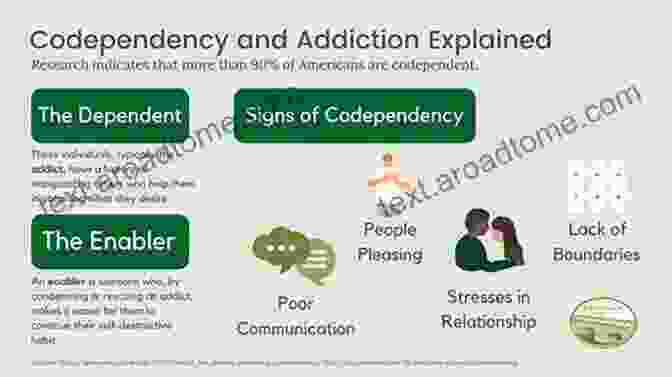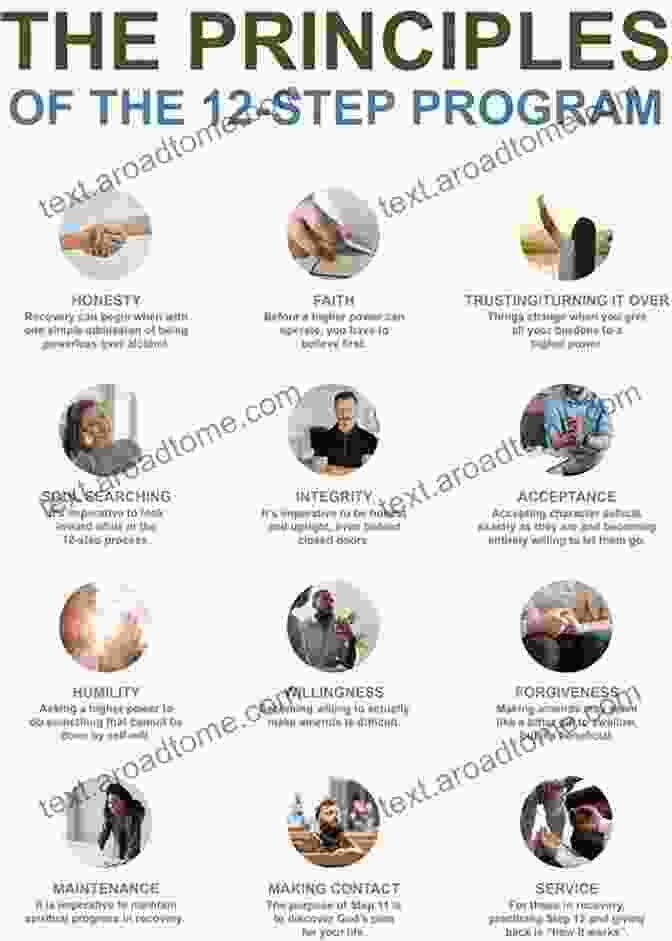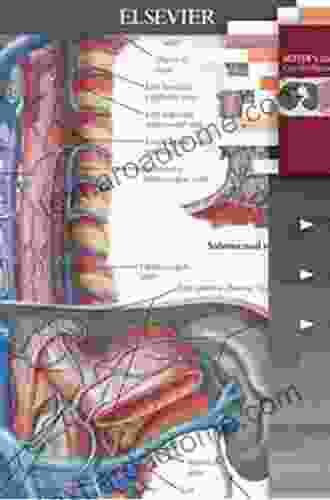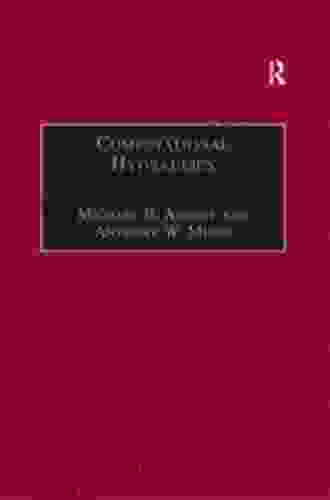Break Free from Addictions and Co-Dependency: A Comprehensive Guide to the 12-Step Method

Addiction and co-dependency are prevalent and debilitating conditions that can wreak havoc on individuals, families, and communities. The 12-Step Method, a time-tested approach to recovery, offers a practical and effective framework for overcoming these challenges. This insightful article will delve into the 12-Step Method, providing a comprehensive understanding of its principles, process, and benefits.
Understanding Addiction and Co-Dependency
4.1 out of 5
| Language | : | English |
| File size | : | 488 KB |
| Text-to-Speech | : | Enabled |
| Screen Reader | : | Supported |
| Enhanced typesetting | : | Enabled |
| Word Wise | : | Enabled |
| Print length | : | 102 pages |
| Lending | : | Enabled |
Addiction is characterized by an irresistible urge to engage in a specific behavior or substance use, despite its negative consequences. Co-dependency, on the other hand, refers to excessive dependence on another person, often a person with an addiction. Both conditions can lead to severe physical, mental, and emotional distress.

The 12-Step Method: A Practical Framework for Recovery
The 12-Step Method is a structured program developed by Alcoholics Anonymous (AA) in the 1930s. This method has been adopted by various support groups that address other addictions and co-dependency. The 12 steps provide a comprehensive roadmap for recovery, guiding individuals through self-discovery, acceptance, and positive change.
1. Admitting Powerlessness
The first step involves admitting that one is powerless over addiction or co-dependency. This step requires an acknowledgment of the limitations of one's own abilities and a willingness to seek help from others.
2. Belief in a Higher Power
The 12-Step Method encourages individuals to develop a relationship with a higher power, which may be a deity, a spiritual concept, or even the collective wisdom of the support group. This connection provides strength, guidance, and hope throughout the recovery journey.
3. Turning Over to a Higher Power
Once an individual has acknowledged their powerlessness and connected with a higher power, they are encouraged to surrender their will and their life to that power. This step involves letting go of control and trusting in a force greater than oneself.
4. Taking Inventory
The fourth step involves taking an honest and thorough inventory of oneself, revealing both strengths and weaknesses. This process helps individuals identify areas where growth and change are needed.
5. Admitting Wrongs
The fifth step encourages individuals to admit their wrongs to themselves, to others, and to a higher power. This step requires courage and humility, but it is essential for breaking free from the guilt and shame associated with addiction or co-dependency.
6. Becoming Willing to Change
The sixth step involves becoming willing to change old, destructive patterns of behavior. This step requires a commitment to personal growth and a willingness to let go of comfortable but harmful habits.
7. Humbly Asking for Help
The seventh step encourages individuals to humbly ask for help from a higher power, sponsors, and other members of their support group. This step underscores the importance of seeking guidance and support from others who have walked a similar path.
8. Making Amends
The eighth step involves making amends to those who have been harmed by one's addiction or co-dependency. This step requires taking responsibility for past actions and making amends in a meaningful and sincere way.
9. Continuing to Take Inventory
The ninth step involves continuing to take inventory of oneself on a regular basis, identifying areas where further growth and improvement are needed. This step emphasizes the importance of ongoing self-reflection and accountability.
10. Continuing to Ask for Help
The tenth step encourages individuals to continue seeking help from a higher power, sponsors, and other members of their support group. This step underscores the importance of maintaining a strong support system throughout the recovery process.
11. Prayer and Meditation
The eleventh step involves seeking spiritual guidance through prayer and meditation. This step helps individuals connect with their higher power and develop a deeper understanding of themselves and the world around them.
12. Carrying the Message
The twelfth step encourages individuals to carry the message of recovery to others who are still struggling with addiction or co-dependency. This step involves sharing one's experience, strength, and hope, offering support and encouragement to others on their recovery journey.
Benefits of the 12-Step Method

The 12-Step Method has proven to be highly effective for overcoming addiction and co-dependency. Studies have shown that 12-Step programs:
* Increase the likelihood of achieving and maintaining sobriety or recovery * Reduce the risk of relapse and recidivism * Improve mental and emotional well-being * Foster personal growth and spiritual development * Strengthen relationships and improve family dynamics
The 12-Step Method is a comprehensive and practical approach to overcoming addiction and co-dependency. Through a structured program of self-discovery, acceptance, and positive change, individuals can break free from the chains that bind them and embark on a path towards recovery and well-being. By embracing the principles of the 12-Step Method, individuals can find support, guidance, and hope as they navigate their recovery journey.
4.1 out of 5
| Language | : | English |
| File size | : | 488 KB |
| Text-to-Speech | : | Enabled |
| Screen Reader | : | Supported |
| Enhanced typesetting | : | Enabled |
| Word Wise | : | Enabled |
| Print length | : | 102 pages |
| Lending | : | Enabled |
Do you want to contribute by writing guest posts on this blog?
Please contact us and send us a resume of previous articles that you have written.
 Book
Book Novel
Novel Page
Page Chapter
Chapter Text
Text Story
Story Genre
Genre Reader
Reader Library
Library Paperback
Paperback E-book
E-book Magazine
Magazine Newspaper
Newspaper Paragraph
Paragraph Sentence
Sentence Bookmark
Bookmark Shelf
Shelf Glossary
Glossary Bibliography
Bibliography Foreword
Foreword Preface
Preface Synopsis
Synopsis Annotation
Annotation Footnote
Footnote Manuscript
Manuscript Scroll
Scroll Codex
Codex Tome
Tome Bestseller
Bestseller Classics
Classics Library card
Library card Narrative
Narrative Biography
Biography Autobiography
Autobiography Memoir
Memoir Reference
Reference Encyclopedia
Encyclopedia Roshanda E Pratt
Roshanda E Pratt Sam Rohdie
Sam Rohdie R Serge Denisoff
R Serge Denisoff Michela Wrong
Michela Wrong Maria White
Maria White Michael Ruse
Michael Ruse Ophelia Field
Ophelia Field Margaret Horton
Margaret Horton Stephanie Yeboah
Stephanie Yeboah Martha Green
Martha Green Nancy Guthrie
Nancy Guthrie Max Humphrey
Max Humphrey Mel Thompson
Mel Thompson Paul Edwards
Paul Edwards Mary Wood
Mary Wood Mel Langston Phd
Mel Langston Phd Yehudah Mirsky
Yehudah Mirsky Michelle Corey
Michelle Corey Robert Francis
Robert Francis Mark Will Weber
Mark Will Weber
Light bulbAdvertise smarter! Our strategic ad space ensures maximum exposure. Reserve your spot today!
 Herman MelvilleFollow ·8.5k
Herman MelvilleFollow ·8.5k Brandon CoxFollow ·3k
Brandon CoxFollow ·3k Jason ReedFollow ·13.7k
Jason ReedFollow ·13.7k Aldous HuxleyFollow ·14k
Aldous HuxleyFollow ·14k Jared PowellFollow ·5.3k
Jared PowellFollow ·5.3k Gustavo CoxFollow ·18.6k
Gustavo CoxFollow ·18.6k James GrayFollow ·8.1k
James GrayFollow ·8.1k George MartinFollow ·7.5k
George MartinFollow ·7.5k

 Ralph Ellison
Ralph EllisonIntelligent Video Surveillance Systems: The Ultimate...
In a world...

 Jeffrey Cox
Jeffrey CoxThe Origins of the Modern World: A Journey to the Roots...
Embark on an Extraordinary...

 Paulo Coelho
Paulo CoelhoUnlock the Power of Integrated Medical Imaging with...
In the rapidly evolving...

 Charles Reed
Charles ReedThe Christ of the Covenants: Unlocking the Mystery of...
Embark on a Profound...

 Elton Hayes
Elton HayesComputational Hydraulics: A Comprehensive Guide for...
In the realm of fluid dynamics,...
4.1 out of 5
| Language | : | English |
| File size | : | 488 KB |
| Text-to-Speech | : | Enabled |
| Screen Reader | : | Supported |
| Enhanced typesetting | : | Enabled |
| Word Wise | : | Enabled |
| Print length | : | 102 pages |
| Lending | : | Enabled |














